Does watermelon contain vitamins and what
Aromatic watermelon is a classic summer treat. The crunch of a ripe berry being cut induces appetite and cheers up. Huge fruits, green on the outside and bright red on the inside, are loved for their fresh, incomparable aroma and juiciness. Watermelons are not only tasty, but also useful: the composition makes the product an indispensable assistant for many diseases and weight loss.
From the article you will find out what vitamins and nutrients are contained in watermelon pulp, whether there is iron, zinc, manganese and other trace elements in watermelon, and how the berry affects male and female health.
The content of the article
Chemical composition
Pleasant taste and juicy pulp of a striped berry due to its rich chemical composition:
- The basis of watermelon is water (85–90%), it contains a lot of fructose, glucose and sucrose (5–13%), there is pectin and fiber (0.5%).
- It contains more than 13 vitamins necessary for the human body.
- Saturated and polyunsaturated fatty acids Omega-3 and Omega-6, which have high biological activity, supply the body with energy, provide mechanical protection and thermal insulation, remove cholesterol, and prevent cardiovascular diseases.
- Macronutrients (potassium, calcium, silicon, magnesium, sodium, sulfur, phosphorus and chlorine) and microelements (aluminum, iron, zinc, manganese, copper, iodine), even in small amounts, ensure the harmonious work of the whole organism.
- Flavonoids - plant polyphenols - have antioxidant properties, neutralize free radicals.
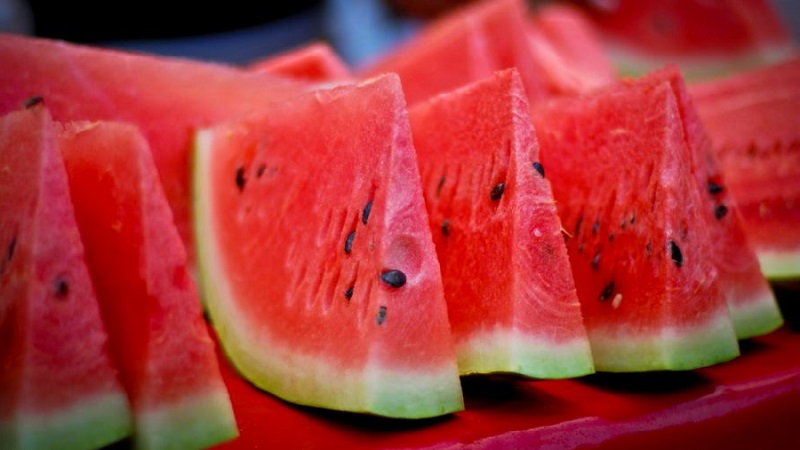
And also in fresh watermelon many essential and non-essential amino acidsimportant for protein synthesis:
- valine - is responsible for the exchange of nitrogen in cells;
- isoleucine - regulates blood sugar levels, participates in the synthesis of hemoglobin and protein in the liver, the production of growth hormone, and regenerates tissues;
- phenylalanine - promotes blood circulation, participates in the formation of insulin;
- threonine - regulates the metabolism of proteins and fats, prevents fatty liver, strengthens the immune system;
- citrulline - removes ammonia and nitrogenous wastes from the blood.
Vitamins and minerals
The vitamins contained in all parts of the watermelon are of particular value: the human body is not able to synthesize them on its own.
Vitamins in the pulp:
| Name | Content in 100 g, mg | Effect on the human body |
| Ascorbic acid (C) |
7 |
A lack of vitamin C leads to muscle pain, scurvy, bleeding gums, tooth loss, and heart disease. |
| Riboflavin (B2) |
0,06 |
The shortage leads to diseases of the organs of vision: photophobia, conjunctivitis, cataracts, optic nerve atrophy, nervous system dysfunction and anemia. |
| Thiamin (B1) |
0,04 |
Deficiency leads to a violation of thermoregulation and the work of the nervous system, shortness of breath, depression. |
| Folic acid (B9) |
0,008 |
The deficiency disrupts the activity of the stomach, pancreas, kidneys, intestines, causes inflammation of the mucous membranes, a feeling of fear, mood disorders. |
| Pyridoxine (B6) |
0,09 |
It is indicated after operations or with a sluggish course of an infectious disease. |
| Vitamin A |
0,017 |
The deficiency leads to gastrointestinal diseases, premature aging, eye diseases. |
| Vitamin B3 (PP) |
0,3 |
It is indicated for gastritis, liver and kidney diseases, skin diseases. The deficiency leads to depression, insomnia, irritability, headaches, disruption of the gastrointestinal tract (diarrhea, heartburn, nausea), decreased mental activity. |
| Tocopherol (E) |
0,1 |
It has antioxidant properties: it removes cholesterol and free radicals.
Recommended for inflammatory processes, strengthens the immune system. |
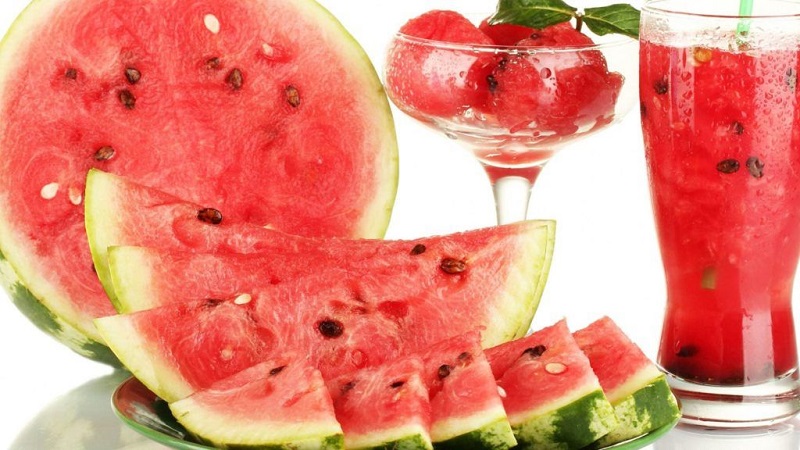
Many do not think about what vitamins are contained in the watermelon rind, and throw it away... In addition to those listed above, it also contains beta-carotene (a precursor of vitamin A). It is responsible for the health of the gonads, has antioxidant and immunostimulating properties. With a lack of carotene, the work of the genitourinary system, the brain is disrupted, pain sensitivity increases.
Many micro and macro elements that are contained in watermelon are even more valuable.e, since they are rare, and without them the body begins to malfunction:
| Name | Content in 100 g, mg | Functions |
| Potassium | 112 |
|
| Sodium | 1 |
|
| Calcium | 7 |
|
| Magnesium | 10 |
|
| Phosphorus | 11 | Participates in the production of hormones, the metabolism of fats, carbohydrates, and cell division. |
| Iron | 0,2 |
|
| Zinc | 0,1 |
|
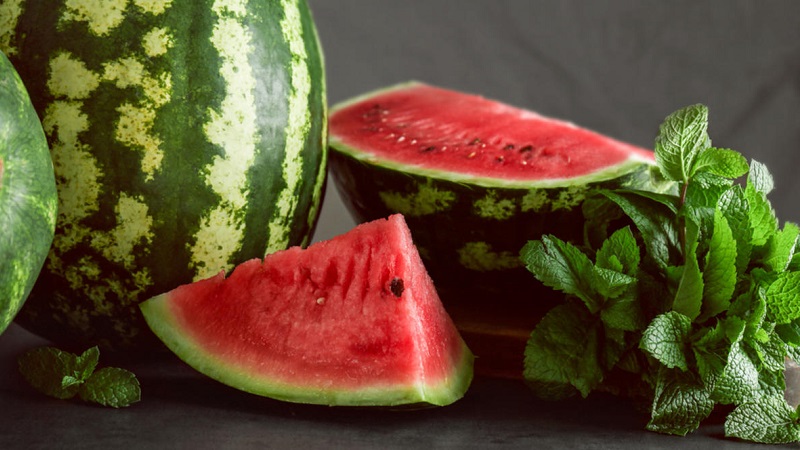
Due to its composition, watermelon is often used for preventive and rehabilitation purposes. people suffering from diseases of the central nervous system, gastrointestinal tract, cardiovascular system, and vitamin deficiency.
Interesting on the topic:
Can you eat watermelon for type 2 diabetes?
Calorie content
Calorie content of watermelon low, despite its high sugar content... This is explained by the fact that the pulp is 90% water, which has no calories. Therefore, 100 g of fresh delicacy contains only 27 kcal.
Interesting!There are more than 1200 varieties of watermelon in the world that are grown in different climatic conditions, which means they contain an unequal amount of fructose and sucrose. On average, 100 g of sugar berries contain up to 35 kcal.
During heat treatment, the calorie content of the product increases due to the addition of sugar or honey. So, 100 g canned berries are 30 kcal, juice - more than 35 kcal.
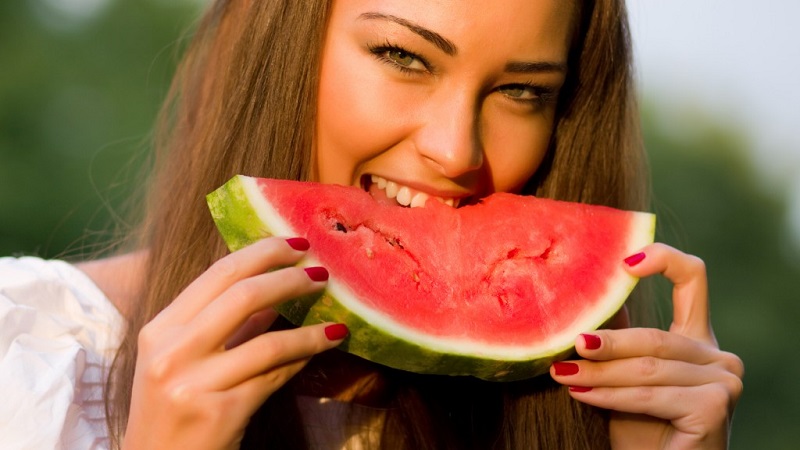
Can I use for weight loss
Watermelon is added in the diet due to its low calorie content:
- it is used as the basis of a mono-diet - while the daily norm of a treat should not exceed 2.5 kg (2000–2500 kcal);
- the pulp is combined with other low-calorie foods (rye bread, chicken breast, zucchini and others).
Important! In pursuit of an ideal figure, exhausting themselves with "fast" diets, many forget that when losing weight, useful substances are also "washed out" from the body. Watermelon saturates with vitamins and minerals.
Fiber in the fetus improves gastric motility, promotes the removal of toxins and liquids. These features allow a losing weight person to "lose" several kilograms of excess weight.
Glycemic index
The glycemic index (GI) of any food indicates the rate at which it is digested and releases glucose.
GI of watermelon is 60-70 units Is a relatively high indicator.
Reference.The higher the GI, the faster foods are broken down, sugar enters the bloodstream, and the pancreas begins to produce insulin. This hormone suppresses glucose, and the person experiences hunger again. High GI foods are not suitable for weight loss.
Due to the high water content sweet berry does not lead to excessive consumption of carbohydrates that saturate the body, therefore it is indicated in the diet.
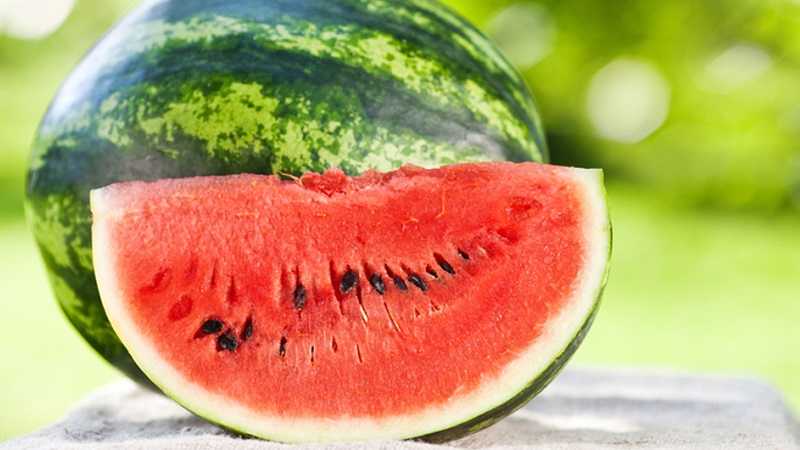
Useful properties of watermelon
Due to the large amount of vitamins and minerals, watermelon is consumed as a preventive and therapeutic agent for many diseases:
- lycopene normalizes blood pressure, improves blood flow, has a beneficial effect on the heart and blood vessels, and prevents the development of cancer cells (products with it are prescribed when recovering from chemotherapy);
- calcium is indicated for people with high bone fragility;
- vitamin A prevents degenerative processes in the organs of vision, heals hair follicles;
- vitamin C improves immunity, improves overall well-being, participates in the production of collagen, which is responsible for the health of the skin;
- B vitamins increase vital energy, the level of resistance to negative external factors;
- water saturated with vitamins and microelements cleanses the kidneys, removes toxins, and fiber cleanses the intestines;
- the complex of all components of watermelon fights obesity.
The undoubted benefits of watermelon makes it one of the most useful dietary products.
Benefits for men
Many do not know the fact that watermelon is extremely useful for men:
- lycopene and citrulline contained in the berry restore and enhance sexual potency. Their action is similar to drugs that increase the sexual activity of men, but at the same time they have no side effects;
- for men involved in strength sports, watermelon will help in building muscle mass, as well as after training as a means of removing lactic acid from the body;
- Treatment of prostate adenoma will be more effective if you consume watermelon pulp 3-4 times a day for 2-3 weeks or drink 2 tbsp. watermelon juice per day (2 weeks).
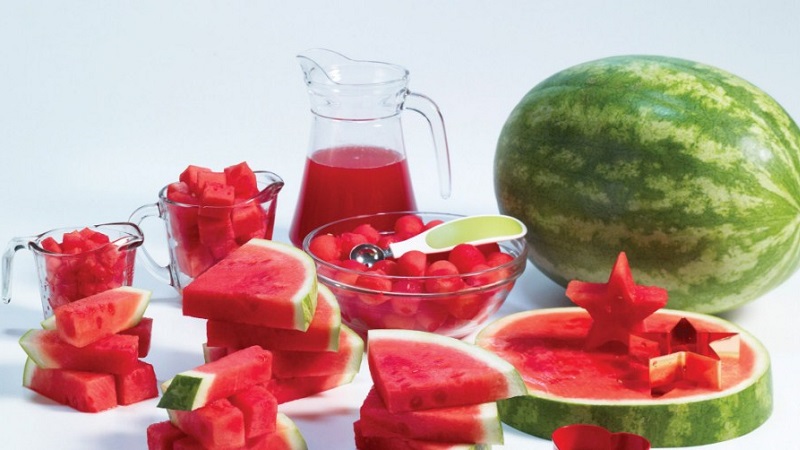
Benefits for women
Watermelon also solves women's problems:
- the substances contained in the seeds stop uterine bleeding;
- watermelon pulp is used as a cosmetic moisturizing and rejuvenating mask: it is applied to gauze and then on the face for 25–30 minutes;
- watermelon with rye bread helps to lose weight without harming health (2 kg of dietary product per 10 kg of body weight are consumed per day for 4-6 days).
Watermelon is useful for pregnant women as a fortified and mineralized product.
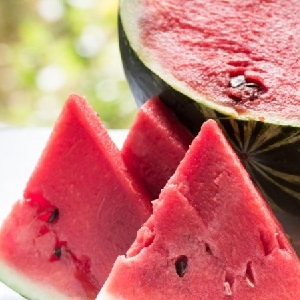 Gynecologists prescribe watermelon to expectant mothers:
Gynecologists prescribe watermelon to expectant mothers:
- in order to restore the digestive tract and prevent constipation;
- to relieve stress, insomnia, normalize the functioning of the nervous system;
- to remove toxins, excess fluid from the body, to combat edema;
- to saturate the body with vitamins and microelements.
It is important for lactating women to consume watermelon in small quantities., as babies have an increased risk of diarrhea from pulp.
Important!Freshly squeezed berry juice is useful for chronic liver and kidney diseases, urolithiasis of the gallbladder, cystitis in women and urinary incontinence in children.
The benefits of fresh watermelon are proven by many studies. and use in traditional and folk medicine.
Read also:
Watermelon increases or decreases blood pressure
Is it possible to eat watermelon with cholecystitis and pancreatitis
Possible harm and contraindications
Despite the enormous benefits, watermelon can cause harm to humans. This is due to chronic diseases or an acute course of the disease, when the use of the fetus causes the outflow of fluid, and with it the drugs. Excessive use of striped berries causes diarrhea, vomiting, heaviness in the abdomen, worsens the general condition of a person.
Important!When buying, choose whole, uncut and uncracked fruit, as due to the high sugar content in the open air, fermentation processes quickly begin in it, which often cause poisoning.
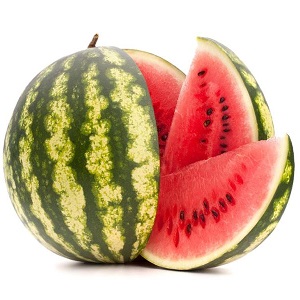 List of diseases in which watermelon is excluded from the diet or carefully take it in food:
List of diseases in which watermelon is excluded from the diet or carefully take it in food:
- disorders of the digestive tractaccompanied by diarrhea, cramps and vomiting;
- the presence of large stones in the kidneys and bladder: a large amount of fluid can provoke the movement of stones, which will lead to intense pain and the need for surgery;
- violation of the outflow of urine, colitis.
Watermelon is able to accumulate nitrates, especially if it was fed with chemicals for rapid ripening. When eating early watermelons (in May - July), severe poisoning with these substances often occurs.
Conclusion
Ripe watermelon is a storehouse of vitamins and minerals contained in the pulp, rind and seeds. Its regular use in the summer replenishes the lack of nutrients in the body, strengthens the immune system.
Despite the high glycemic index and the amount of sugars, the berry is low in calories, 90% water, therefore it forms the basis of many dietary diets. The fruit is equally valuable to men and women. For certain diseases, it is eaten with caution.